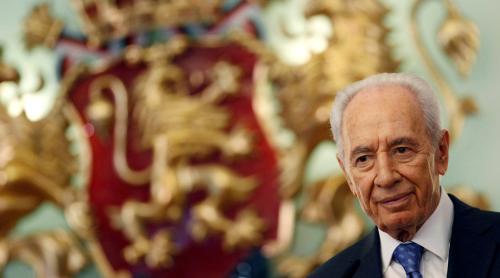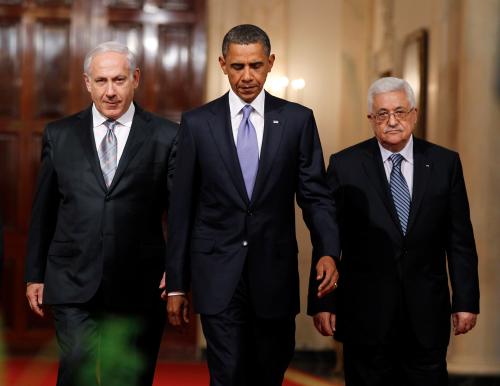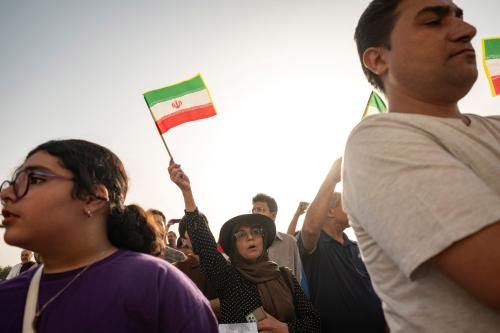In a new biography of Yitzhak Rabin (“Yitzhak Rabin: Soldier, Leader, Statesman”), Itamar Rabinovich—president of the Israel Institute and Rabin’s ambassador to the United States—recounts the remarkable life of the late prime minister of Israel.
He describes Rabin’s rise from a young officer in 1948 to commander of the Israeli military in 1967, to prime minister for the first time in the 1970s, to world-celebrated stabtesman and peacemaker before his assassination in 1995.
On March 9, the Center for Middle East Policy at Brookings hosted an event to discuss the book and Rabin’s life. The event featured keynote remarks from President Bill Clinton, who worked closely with Rabin, as well as a conversation between Ambassador Rabinovich and Dalia Rabin, the late prime minister’s daughter and a former member of the Knesset. Brookings Executive Vice President Martin Indyk, who was Clinton’s ambassador to Rabin’s Israel, moderated the event.
Bill Clinton reminisces about Yitzhak #Rabin, subject of new biography by Itamar Rabinovich @BrookingsFP. pic.twitter.com/ffRpC53Pug
— Strobe Talbott (@strobetalbott) March 9, 2017
President Clinton reflected on Rabin’s tireless efforts to bring about Israeli-Palestinian peace. He affirmed his deep respect and admiration for Rabin and what he represented, saying: “The day that Yitzhak was killed was maybe the worst day I had in the White House.” Clinton went on to list the many lessons he learned from Rabin’s example. “The first thing I learned from him is don’t do the easy thing, do the right thing.”
https://www.youtube.com/watch?v=t5-8s7v2_f8?t=12m10s
President Clinton lauded the late prime minister’s foresight in trying to prevent the worst trends now apparent in the Middle East. “In the microcosm of the Middle East,” Clinton explained, “[Rabin] prefigured the battle that is now raging across the world…where people who claim to want the nation-state are actually trying to have a pan-national movement to institutionalize separatism and division within national borders all over the world…it’s like we’re all having an identity crisis all at once.” But, Clinton continued, “[Rabin], tried to reconcile the conflict…not only [within] the country but within the hearts and minds of a huge percentage of this people.”
"The whole history of humankind is basically about who is us and who is them." – @billclinton at Brookings. https://t.co/WqwM1GxIVI #Rabin pic.twitter.com/2POmOe2tsF
— Brookings Foreign Policy (@BrookingsFP) March 13, 2017
President Clinton concluded by reflecting on Rabin’s courage and trustworthiness, traits that left other world leaders in awe.
https://www.youtube.com/watch?v=t5-8s7v2_f8?t=28m43s
Following President Clinton’s remarks, Brookings Executive Vice President Martin Indyk moderated a conversation between Ambassador Rabinovich and Dalia Rabin.
.@BrookingsInst's @Martin_Indyk, Dalia #Rabin & Itamar Rabinovich assess Yitzhak Rabin's motives, crises, & triumphs. pic.twitter.com/88z3C2DOAw
— Strobe Talbott (@strobetalbott) March 9, 2017
Rabinovich began by describing Rabin’s accomplishments and deliberate leadership style in military affairs, which, Rabinovich argued, paved the way for his success as a political leader. “He really was one of the most courageous generals,” Dalia Rabin added. “He was focused, he had very strong self-confidence, and was always sure about the way he chose…these are elements that come from being a general and went further into his success as a statesman.”
Rabinovich went on to describe Rabin as a strategic thinker and a meticulous planner. “He knew the details, but at the same time, he also saw the bigger picture.”
https://www.youtube.com/watch?v=t5-8s7v2_f8?t=46m18s
When it came to the peace process and the question of whether Rabin supported an independent Palestinian state, Dalia Rabin described her father as prudent, pragmatic, and realistic. He wanted to move forward, she said, “but he was very cautious…His idea was of a peaceful separation, incorporation and reconciliation, words that disappeared from the arena.”
https://www.youtube.com/watch?v=t5-8s7v2_f8?t=51m53s
Finally, Indyk asked Rabinovich how he thinks Rabin ought to be remembered, to which Rabinovich replied: “I think he should be remembered first and foremost as a human being, as a leader, as a person.” He should also be remembered as a statesman, Rabinovich continued:
“A statesman needs a vision about where he or she wants to take the country; they need courage in order to implement a vision that is not necessarily popular; and thirdly, they need the authority with their own people in order to carry their people with them. I think [Rabin] in his second term had all three.”
https://www.youtube.com/watch?v=t5-8s7v2_f8?t=58m36s
Dalia Rabin concluded by explaining why her father ought to be remembered for more than his assassination. “Yitzhak Rabin was so much more…He was the leader, he was committed to [a] good life of the Israeli people. And the peace process was a platform to make Israel a good place to live in.”
The Brookings Institution is committed to quality, independence, and impact.
We are supported by a diverse array of funders. In line with our values and policies, each Brookings publication represents the sole views of its author(s).







Commentary
On the life and legacy of Yitzhak Rabin
March 14, 2017